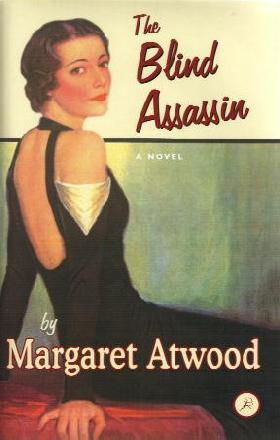
Margaret Atwood
The following novels constitute the shortlist for the 2000 Booker Prize:
Notable Omissions from the 2000 Shortlist

|
The Blind Assassin Margaret Atwood |
Dustjacket synopsis:
"'Ten days after the war ended, my sister Laura drove a car off a bridge.' Thus begins The Blind Assassin, Margaret Atwood's stunning new novel. Laura Chase's older sister Iris, married at eighteen to a politically prominent industrialist but now poor and eighty-two, is living in Port Ticonderoga, a town dominated by their once-properous family before the First War. While coping with her unreliable body, Iris reflects on her far from exemplary life, in particular the events surrounding her sister's tragic death. Chief among these was the publication of The Blind Assassin, a novel which earned the dead Laura Chase not only notoriety but also a devoted cult following: as Iris says, she herself lives 'in the long shadow cast by Laura'.
"Sexually explicit for its time, The Blind Assassin describes the risky affair in the turbulant thirties between a wealthy young woman and a man on the run. During their secret meetings in rented rooms, the lovers concoct a pulp fantasy set on Planet Zycron. As the invented story twists through love and sacrifice and betrayal, so does the the real one; while events in both move closer to war and catastrophe. By turns lyrical, outrageous, formidable, compelling and funny, this is a novel filled with deep humour and dark drama. It is Margaret Atwood at her breathtaking best."
Quotes:
"Storytelling has long been a favorite hobby of many of Margaret Atwood's characters. For some, it's a way to distance
themselves from painful memories while mythologizing mundane triumphs and travails; for others, it's a means of
discovering their own identities, a way of connecting the dots in their lives, of turning random points of light into
something resembling a starry constellation...Much of what ensues in The Blind Assassin is unapologetically
melodramatic: in addition to several suicides in the Chase family, there are intimations of child abuse and intra-family
adultery, not to mention loads of scheming, manipulation and intrigue. Ms. Atwood grounds these events in carefully
observed social and emotional detail, even as she sends up her more sensationalistic impulses in the extracts from Laura's
novelette (also called "The Blind Assassin"), which features passages from a pulp fiction story written by its hero.
That story, set on a planet far, far away, depicts a bloody, class-riven society that sacrifices its young to propitiate
ancient gods, and a chilling assassination plot involving a blind killer...Compelling in its lurid way as "The Blind
Assassin" the novelette may be, it pales in comparison to the virtuosic storytelling on display in The Blind Assassin
the novel." - Michiko Kakutani, New York Times
"In her tenth novel, Margaret Atwood again demonstrates that she has mastered the art of creating dense, complex fictions
from carefully layered narratives, making use of an array of literary devices - flashbacks, multiple time schemes,
ambiguous, indeterminate plots - and that she can hook her readers by virtue of her exceptional story-telling
skills...Atwood has always sought to collapse and subvert different genres, so it isn't surprising that her family saga
should encompass pulp sci-fi, clue-strewn detective novel, newspaper reportage and tragic confessional romance. The
ingenuity of its chameleon narrative, and Atwood's assured handling of atmosphere, constitute an impressive attempt to
cover an awful lot of ground - not least the whirlwind of social and political change that makes the sisters' rarefied
childhood a dangerous anachronism - at the same time as exploring the hidden history of one family." - Alex Clark,
Guardian
First Paragraph:
Ten days after the war ended, my sister Laura drove a car off a bridge. The bridge was being repaired: she went right through the Danger sign. The car fell a hundred feet into the ravine, smashing through the treetops feathery with new leaves, then burst into flames and rolled down into the shallow creek at the bottom. Chunks of the bridge fell on top of it. Nothing much was left of her but charred smithereens.
I was informed of the accident by a policeman: the car was mine, and they'd traced the licence. His tone was respectful: no doubt he recognized Richard's name. He said the tires may have caught on a streetcar track or the brakes may have failed, but he also felt bound to inform me that two witnesses - a retired lawyer and a bank teller, dependable people - had claimed to have seen the whole thing. They'd said Laura had turned the car sharply and deliberately, and had plunged off the bridge with no more fuss than stepping off a curb. They'd noticed her hands on the wheel because of the white gloves she'd been wearing.
It wasn't the brakes, I thought. She had her reasons. Not that they were ever the same as anybody else's reasons. She was completely ruthless in that way.
"I suppose you want someone to identify her," I said. "I'll come down as soon as I can." I could hear the calmness of my own voice, as if from a distance. In reality I could barely get the words out; my mouth was numb, my entire face was rigid with pain. I felt as if I'd been to the dentist. I was furious with Laura for what she'd done, but also with the policeman for implying that she'd done it. A hot wind was blowing around my head, the strands of my hair lifting and swirling in it, like ink spilled in water.
From the Seeker & Warburg hardback edition, 1999.
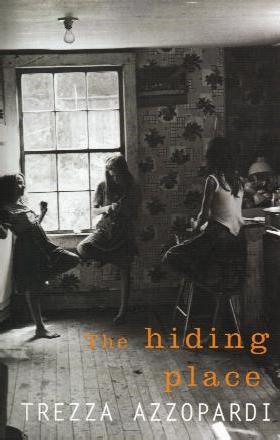
|
The Hiding Place Trezza Azzopardi |
Dustjacket synopsis:
"Tiger Bay, Cardiff, 1948. Frank Gauci steps off the Callisto into the coldest winter ever, clutching a cardboard suitcase. It's all he has, until he finds a ruby ring, Joe Medora, and Mary.
"When Frankie and his best friend Salvatore opens the doors of the Moonlight Cafe, life seems good: downstairs there is sweet music, hot food, beautiful girls; and upstairs, there is gambling. Stick or Twist. It's Frankie's call. But luck becomes a stranger to Frankie. With a mass of debts, five daughters, and another child on the way, he turns to the card table one last time.
"Through the eyes of Delores, the Gaucis' youngest child, Trezza Azzopardi reveals a world rarely seen in fiction - the Cardiff underworld of the sixties. In prose that is sensitive and utterly compelling we discover the cafes and bars, the crumbling estates, the gaming rooms - and the secrets that destroy a family.
"Trezza Azzopardi is an extraordinary new voice in contemporary writing."
Quotes:
"Vivid, moving, alive: The Hiding Place opens up ordinary-looking doors to let us into an intense and
brilliantly foreign world" - Andrea Ashworth, author of Once in a House on Fire
First Paragraph:
Despite the fact that Carol Jackson has to sit in a pram, she and her mother are going out together, while mine is downstairs whispering with a perfumed woman in an animal skin.
I watch as the pram disappears round the edge of the street. Mrs Jackson's stick legs and slippers are the last bits to vanish, but if I move my face further left into the crack of the window, I might still see them. I don't do this. I lick the glass I've frosted with my breath, to get a clear view up the hill to the betting shop, and wait for my father, like I'm told.
When my mother's friend Eva slipped in through the back door, I expected her to stay put. But she followed us up the stairs. She stood on the landing in her ocelot coat, with one hand closed upon the other. My mother stationed me at the glass.
From the Picador paperback edition, 2000.
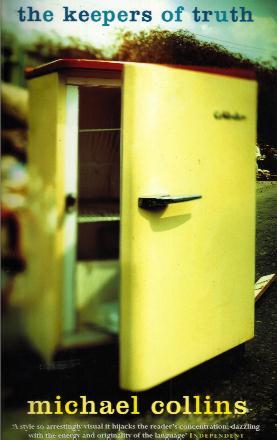
|
The Keepers of Truth Michael Collins |
Dustjacket synopsis:
"The last of a manufacturing dynasty in a dying industrial town, Bill lives alone in the family mansion and works for the Truth, the moribund local paper. He years to write long philosophical think pieces about the American dream gone sour, not the flaccid write-ups of homebake contests and high-school sports demanded by the Truth. Then old man Lawton goes misisng, and suspicion fixes on his son Ronny, bad boy of the area. Paradoxically, the spectre of violent death breathes new life into the town, with network attention and national scoops for the Truth. For Bill, a deeper and more disturbing involvement with the Lawtons themselves ensues. The Lawton murder and the obsessions it awakes in the town come to symbolise the mood of a nation on the edge.
"In this piercing new novel, Michael Collins turns his uncompromising vision to eighties small-town America. Compulsively readable, The Keepers of Truth startles both with its insights and with Collins's characteristically incisive writing."
Quotes:
"A style so arrestingly visual it hijacks the reader's concentration; dazzling with the energy and originality
of the language" - Independent
"Collins creates a gripping picture of slow-moving, small-town life, and packs it into a treat of a murder mystery." - Isobel
Montgomery, Guardian
First Paragraph:
I call this one 'Ode to a Trainee Manager'.
When you enter this town of ours, I would want you to read the following, to enlighten you as to how it is here with us at this time in history. It seems only right. Even in medieval times they used to put up signs that said, 'plague! Keep Out.'
This is what I'd say...
We have made nothing in this town for over a decade. It's as though a plague befell ur men, as horrible as any of the the plagues that fell on Egypt. Our men used to manufacture cars, sheet metal, mobil ehomes, washers and dryers, frame doors, steel girders for bridges and skyscrapers. Our town had contracts from Sears and Ford and General Motors. Everybody worked in the factories, bending metal into the shape of car fenders, gaskets, engine blocks, distributor caps, sewing vinyl seats for Cadillacs and Continentals. We had hands throbbing to make things. Factories are our cathedrals, pushed up out of the Great Plains.
From the Phoenix House paperback edition, 2000.

|
When We Were Orphans Kazuo Ishiguro |
Dustjacket synopsis:
"England, 1930s. Christopher Banks had become the country's most celebrated detective, his cases the talk of London society. Yet one unsolved crime has always haunted him: the mysterious disappearance of his parents, in Old Shanghai, when he was a small boy. Now, as the world lurches towards total war, Banks realizes that the time has come for him to return to the city of his childhood and at last solve the mystery - that only by doing so will civilization be saved from the approaching catastrophe.
"Moving between London and Shanghai of the inter-war years, When We Were Orphans is a story of memory, intrigue and the need to return; of a childhood vision of the world surviving deep into adulthood, indelibly shaping and distorting a person's life."
Quotes:
"The Japanese-born Ishiguro has described his own style as one that 'suppresses meaning' and has attributed his success
to 'tackling on a thematic level the implications' of this style, of the voice his narrators use to avoid self-knowledge.
For Ishiguro, the orphans of his title are bereft of parents and yet also defined by them; they can never get over their
loss because their parents are always already absent. The orphan's life is never fully his own, but seems instead as
secondhand as the form of this novel itself, so brilliant in its tireless echoes of earlier texts. When We Were
Orphans goes much farther than even The Remains of the Day in its examination of the roles we've had handed to
us. It suggests that the butler's inability to get beyond his professional script may be endemic in a world in which we
are all eventually orphans. Whatever the sense of Graham Greene's 'personally impossible' that has so persistently drawn
him to such material, I have little doubt that Kazuo Ishiguro will himself avoid the oblivion into which his narrators
all finally sink. When We Were Orphans is his fullest achievement yet." - Michael Gorra, New York Times
"After the exquisitely restrained and limpid prose of his first three novels, Kazuo Ishiguro made an impressive - though
to some, baffling - leap from realism into a recondite, dreamlike world in The Unconsoled (1995). His fifth novel
melds both these techniques in its rich exploration of the rupture of childhood and the baggage we carry from that 'foreign
land'. Yet its surreal excursions benefit from clearer signposting, and the meandering longueurs of The Unconsoled
have given way to suspense, intrigue and even a lightning-flash denouement...Ishiguro shows immense tenderness for his
characters, however absurd or deluded they may be. If at times the signposting becomes almost too overt ("Our fate is to
face the world as orphans, chasing through the long years the shadows of vanished parents"), this clarity is welcome in a
richly layered novel that brings together themes from the author's past oeuvre. In its use of an array of techniques to
illuminate psychological and political truths, When We Were Orphans confirms Ishiguro as one of Britain's most
formally daring and challenging novelists." - Maya Jaggi, Guardian
First Paragraph:
It was the summer of 1923, the summer I came down from Cambridge, when despite my aunt's wishes that I return to Shropshire, I decided my future lay in the capital and took up a small flat at Number 14b Bedford Gardens in Kensington. I remember it now as the most wonderful of summers. After years of being surrounded by fellows, both at school and at Cambridge, I took great pleasure in my own company. I enjoyed the London parks, the quiet of the Reading Room at the British Museum; I indulged entire afternoons strolling the streets of Kensington, outlining to myself plans for my future, pausing once in a while to admire how here in England, even in the midst of such a great city, creepers and ivy are to be found clinging to the fronts of fine houses.
It was on one such leisurely walk that I encountered quite by chance an old schoolfriend, James Osbourne, and discovering him to be a neighbour, suggested he call on me when he was next passing. Although at that point I had yet to receive a single visitor in my rooms, I issued my invitation with confidence, having chosen the premises with some care. The rent was not high, but my landlady had furnished the place in a tasteful manner that evoked an unhurried Victorian past; the drawing room, which received plenty of sun throughout the first half of the day, contained an ageing sofa as well as two snug armchairs, an antique sideboard and an oak bookcase filled with crumbling encyclopaedias — all of which I was convinced would win the approval of any visitor. Moreover, almost immediately upon taking the rooms, I had walked over to Knightsbridge and acquired there a Queen Anne tea service, several packets of fine teas, and a large tin of biscuits. So when Osbourne did happen along one morning a few days later, I was able to serve out the refreshments with an assurance that never once permitted him to suppose he was my first guest.
From the faber and faber paperback edition, 2000.
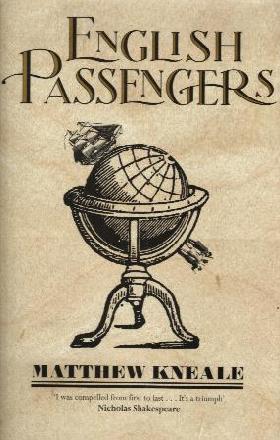
|
English Passengers Matthew Kneale |
Dustjacket synopsis:
"Full of dangerous humour English Passengers combines wit, adventure and harrowing historical detal in a mesmerizing display of storytelling.
"Determined to prove the literal truth of the Bible against atheist gelogists, the Reverend Geoffrey Wilson sets out from England, in the summer of 1857, with an expedition to find the Garden of Eden, which he is convinced lies on the island of Tasmania, Unknown to him, others in the party have very different agendas, notably the surgeon, Dr Potter, who is developing a revolutionary and sinister thesis of his own on the races of man. To complicate matters further, the ship Wilson has hurriedly chartered, crewed by Captain Kewley and his secretive Manxmen, is in fact an ill-starred smuggling vessel, its hidden compartments filled with contraband brandy and tobacco.
"As the vessel journeys haplessly southwards, in Tasmania itself an Aboriginal named Peevay recounts his people's struggle against the invading British, who prove as lethal in their good intentions as in their cruelty. This is no Eden but a world of hunting parties and colonial ethnic cleansing. As the Englsih passengers near Peevay's land, their bizarre notions ever more painfully at odds with reality, it grows clear that a mighty collision is approaching.
"English Passengers is narrated by over twenty different characters, each so distinct that the effect is of a story not so much told as peopled. In a storm of hugely entertaining voices it brings a past age to vivid and memorable life."
Quotes:
"I was compelled from first to last...It's a triumph" - Nicholas Shakespeare
"I am hugely impressed by English Passengers. The construction is masterly - multiple voices contributing to a
compelling narrative. This is writing of the first order" - Penelope Lively
"Matthew Kneale's new novel is a
fine piece of historical fiction that reminds us that men of science and men of God were both agents of genocidal
imperialism...The book is narrated by a host of characters, most notably Peevay, the child of a fearsome female aborigine
warrior and the white convict who raped her. His descriptions of the white settlers' cruelties, and his own confusions as
his world vanishes, counterbalance the arrogance of the governors, farmers, soldiers and missionaries...For all its
grimness - and the decline of the Tasmanian aborigines in Christian 'villages' is movingly rendered - this is a pleasantly
witty book. Kewley turns out to be a decent cove, and his accounts, shot through with Manx cuss-words, show Reverend
Wilson and Dr Potter at their very worst. Not that the two men do themselves any favours; Wilson's mincing English, all
circumlocution and false piety, never fails to betray his selfishness and weakness, while Potter's notebook bigotry is
short on prepositions and heavy on underlining, the style of lunatic letter-writers through history. All of this makes for
a more intelligent and fulfilling book than the subject matter might suggest." - Robert Potts, Observer
First Paragraph:
Say a man catches a bullet through his skull in somebody's war, so where's the beginning of that? You might say that's easy. That little moment has its start the day our hero goes marching off to fight with his new soldier friends, all clever and smirking and waving at the girls. But does it, though? Why not the moment he first takes the shilling, his mouth hanging wide open like a harvest frog as he listens to the sergeant's flatterings? Or how about that bright sunny morning when he's just turned six and sees soldiers striding down the village street, fierce and jangling? But then why not go right back, all the way, to that long, still night when a little baby is born, staring and new, with tiniest little hands? Hands you'd never think would grow strong enough one day to lift a heavy gun, and put a bullet through our poor dead friend's brain.
If I had to choose a beginning for all these little curiosities that have been happening themselves at me, well, I'd probably pick that morning when we were journeying northwards from a certain discreet French port, where tobacco and brandy were as cheap as could be. Not that it seemed much like the beginning of anything at the time, but almost the end, or so I was hoping. The wind was steady, the ship was taking her weather nicely, and as we went about our work I dare say every man aboard was having a fine time dreaming money he hadn't yet got, and what pleasures it might buy him. Some will have been spending it faster than a piss over the side, dreaming themselves a rush of drink and smoke, then perhaps a loan of a sulky female's body. A few might have dreamed every penny on a new jacket or boots, to dazzle Peel City with fashion for a day or two. Others would have kept cautious, dreaming it on rent paid and wives quieted.
And Illiam Quillian Kewley?
From the Hamish Hamilton hardback edition, 2000.
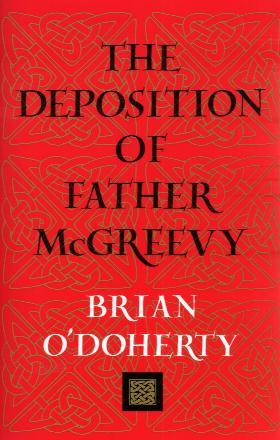
|
The Deposition of Father McGreevy Brian O'Doherty |
Dustjacket synopsis:
"In a London pub of the 1950s, editor William Maginn is intrigued by the mention of the strange - and reputedly shameful - demise of a remote mountain village in Kerry, Ireland, where he was born. Maginn returns to Kerry and uncovers an astonishing tale: both the account of the destruction of a place and a way of life which once preserved Ireland's ancient traditions and the tragedy of an increasingly isolated village where all the women mysteriously die - leaving the priest, Father McGreevy, to cope with insoluble problems. As war rages through Europe, McGreevy struggles to preserve what remains of his parish, against the rough mountain elements and the grief and superstitions of his people, and the growing distrust of the town below. An engrossing narrative in prose filled with grace and poetry, Brian O'Doherty's The Deposition of Father McGreevy explores the locus of misfortune and the very nature of evil."
Quotes:
"Father McGreevy has a confession to make. And when he's done, close to 400 pages later, you're ready to forgive him for
almost anything, including his tendency to ramble. Certainly his flock gives him plenty to talk about: unexplained deaths,
lewd accusations, a mysterious fire and bitter poverty. Brian O'Doherty's fascinating second novel is set in a rural
parish, high atop a mountain in World War II Ireland...there is nothing typical about the author's artistry, and the
novel, despite the ominous foreshadowing Father McGreevy constantly employs, is much more devious than a genre thriller." -
Liam Callanan, New York Times
"Until tonight, I was convinced that O'Doherty, whilst providing a most poetic narrative, hadn't yet produced that vital
spark to really get me drawn into his tale. But then I began to wonder about William Maginn. I discovered that Maginn was
an Irish writer who had contributed to legendary Blackwood's magazine. That made me curious, so I did some further
research on Fraser's Magazine. I found the connection in an article about a writer who I've studied much recently, the
Reverend Francis Sylvester O'Mahony, the one and only 'Father Prout'. As Maginn himself remarks, "everyone in Ireland is
related to everyone else", so I was drawn to this literary figure who shares my surname. I'm delighted by O'Doherty's
literary teaser, for it turns out that William Maginn founded Fraser's Magazine in 1830 (he was also known as "Ensign
O'Doherty" on Blackwood's Magazine). And considering that he must he 150 years old by the time that he stumbles upon
Father McGreevy's deposition, William Maginn's not that bad as a narrator at all. He certainly got me hooked by the
end." - Kevin Patrick Mahoney
First Paragraph:
It's a mystery why a pub draws a set of people and gets a name for itself. Suddenly, it's the place to be - until some other pub replaces it. The Antelope in London has had a bit of a shine to it for several years now. The beer, apart from the Guinness, was as good as you'll find, and the owner decent enough, though he wasn't too keen to see me after he'd had to call a taxi a few times to bring me home.
I was well on that day when Augustus John came in. He always came in as if Lear had found a door on the heath. He had some Polish fellow with him by the name of Felix. It was Felix this and Felix that and by the end of the night we were all drinking toasts to Felix, who was as convenient an excuse as any. John, a large shaggy animal, presided as he always did, always the center of attention. He's a fine looking man, and if I looked like him, I'd think the world owed me its attention.
From the Turtle Point Press, Books and Co., Helen Marx Books paperback edition, 1999.
Notable Omissions from the Shortlist:
The Plato Papers: A Prophesy, Peter Ackroyd
Long Hot Summer, Barbara Anderson
Drylands, Thea Astley (co-winner of the 2000 Miles Franklin Award)
Eclipse, John Banville
Love Etc, Julian Barnes
The Rights of Desire, Andre Brink
The Rules of Engagement, Catherine Bush
The Biographer's Tale, A.S. Byatt
Fred & Edie, Jill Dawson (shortlisted for the 2000 Whitbread Novel Award and the 2001 Orange Prize)
The Rose Grower, Michelle de Kretser
The Book of the Heathen, Robert Edric
Pillars of Gold, Alice Thomas Ellis
What are You Like?, Anne Enright (shortlisted for the 2000 Whitbread Novel Award)
Under the Skin, Michel Faber (shortlisted for the 2000 Whitbread First Novel Award)
Pilgrim, Timothy Findley
The Temple of Optimism, James Fleming
The Rising Sun, Douglas Galbraith
The Flight of the Maidens, Jane Gardam
Danny Boy, Jo-Ann Goodwin (shortlisted for the 2000 Whitbread First Novel Award)
When I Lived in Modern Times, Linda Grant (winner of the 2000 Orange prize)
The Idea of Perfection, Kate Grenville (winner of the 2001 Orange prize)
Moth Smoke, Mohsin Hamid
Born Free, Laura Hird (shortlisted for the 2000 Whitbread First Novel Award)
Mr Phillips, John Lanchester
The Hunter, Julia Leigh
The Big House, Helena McEwen
Martha Peake, Patrick McGrath
No Great Mischief, Alistair MacLeod
Vacant Possession, Hilary Mantel
Conditions of Faith, Alex Miller
The Romantics, Pankaj Mishra
King of the City, Michael Moorcock
The Justification of Johann Gutenberg, Blake Morrison
In the Shape of a Boar, Lawrence Norfolk
A Squatter's Tale, Ike Oguine
Anil's Ghost, Michael Ondaatje
The Atlantic Sound, Caryl Phillips
A Shadow of Myself, Mike Phillips
Benang, Kim Scott (co-winner of the 2000 Miles Franklin Award)
How the Dead Live, Will Self (shortlisted for the 2000 Whitbread Novel Award)
The Gravity of Sunlight, Rosa Shand
An Obedient Father, Akhil Sharma
White Teeth, Zadie Smith (winner of the 2000 Whitbread First Novel Award)
London Bridges, Jane Stevenson
Pieces of Light, Adam Thorpe
Affinity, Sarah Waters
The Powerbook, Jeanette Winterson
This page and its contents are copyright © 2002-05 by Perry Middlemiss, Melbourne, Victoria, Australia.
Last modified: October 17, 2005.